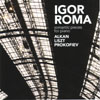Alkan; Liszt; Prokofiev Pf Wks
Being a virtuoso may be impressive but sometimes it just isn’t enough
View record and artist detailsRecord and Artist Details
Composer or Director: Sergey Prokofiev, (Charles-)Valentin Alkan, Franz Liszt
Genre:
Instrumental
Label: Challenge Classics
Magazine Review Date: 13/2006
Media Format: CD or Download
Media Runtime: 72
Mastering:
Stereo
DDD
Catalogue Number: CC72154

Tracks:
| Composition | Artist Credit |
|---|---|
| (12) Études dans les tons mineurs, Movement: Le festin d'Esope |
(Charles-)Valentin Alkan, Composer
(Charles-)Valentin Alkan, Composer Igor Roma, Piano |
| Saltarelle |
(Charles-)Valentin Alkan, Composer
(Charles-)Valentin Alkan, Composer Igor Roma, Piano |
| Venezia e Napoli (orig version) |
Franz Liszt, Composer
Franz Liszt, Composer Igor Roma, Piano |
| (12) Etudes d'exécution transcendante, Movement: No. 11, Harmonies du soir |
Franz Liszt, Composer
Franz Liszt, Composer Igor Roma, Piano |
| Romeo and Juliet |
Sergey Prokofiev, Composer
Igor Roma, Piano Sergey Prokofiev, Composer |
Author: Bryce Morrison
Challenge Records tells us nothing about Igor Roma though the internet is more informative; apparently he won first prize in the 1996 Liszt Competition in Utrecht and a variety of awards elsewhere. Alas, such a prize does not necessarily guarantee quality and Roma’s way with Liszt’s Venezia e Napoli (a garland of encores after the Années de pèlerinage, Book 2 – Italy) is brutally unsubtle and undifferentiated. Granted, few pianists can have hacked their way through so many notes with greater aplomb (repeated notes in the Tarantella are like bursts of machine-gun fire) though such steel-tipped virtuosity brings sadly limited musical returns.
Alkan’s Le festin d’Esope also offers prodigies of virtuosity (try Variation 18 for a scarcely credible storm of brilliance, even though it is marked piano e leggieremente) but instead of evoking “all manner of creeping crawling things, aquatic personages, winged ones and growling yapping beasties” (Raymond Lewenthal), this remains a self-defeating display. Much of Romeo and Juliet suffers the same fate with too little balletic grace in “Folkdance” and a tempo for “The Young Juliet” that nearly rockets her into the stratosphere. True, when the music is serene or contemplative (“Romeo bids Juliet farewell”) Roma relaxes into a more musical and characterful frame of mind. But overall these performances are high on bravura and short on lyricism. The recording is as bright and frosty as the playing.
Alkan’s Le festin d’Esope also offers prodigies of virtuosity (try Variation 18 for a scarcely credible storm of brilliance, even though it is marked piano e leggieremente) but instead of evoking “all manner of creeping crawling things, aquatic personages, winged ones and growling yapping beasties” (Raymond Lewenthal), this remains a self-defeating display. Much of Romeo and Juliet suffers the same fate with too little balletic grace in “Folkdance” and a tempo for “The Young Juliet” that nearly rockets her into the stratosphere. True, when the music is serene or contemplative (“Romeo bids Juliet farewell”) Roma relaxes into a more musical and characterful frame of mind. But overall these performances are high on bravura and short on lyricism. The recording is as bright and frosty as the playing.
Discover the world's largest classical music catalogue with Presto Music.

Gramophone Digital Club
- Digital Edition
- Digital Archive
- Reviews Database
- Full website access
From £8.75 / month
Subscribe
Gramophone Full Club
- Print Edition
- Digital Edition
- Digital Archive
- Reviews Database
- Full website access
From £11.00 / month
Subscribe
If you are a library, university or other organisation that would be interested in an institutional subscription to Gramophone please click here for further information.




